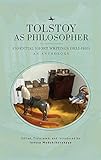Tolstoy as Philosopher. Essential Short Writings : An Anthology / Leo Tolstoy; ed. by Inessa Medzhibovskaya.
Material type: TextPublisher: Boston, MA : Academic Studies Press, [2022]Copyright date: ©2022Description: 1 online resource (426 p.)Content type:
TextPublisher: Boston, MA : Academic Studies Press, [2022]Copyright date: ©2022Description: 1 online resource (426 p.)Content type: - 9781644694039
- LITERARY CRITICISM / General
- Autobiographical fiction and nonfiction
- Philosophy and practice of life
- agency and political action
- and society
- art
- education and pedagogy
- law and society
- mutual aid
- nonviolence
- responsibility and justice
- science
- studies in the life of the mind and spirituality
- sustainable living
- the philosophy of childhood and child psychology
- 891.73/3 23/eng/20220622
- PG3366.A13 M43 2022
- online - DeGruyter
| Item type | Current library | Call number | URL | Status | Notes | Barcode | |
|---|---|---|---|---|---|---|---|
 eBook
eBook
|
Biblioteca "Angelicum" Pont. Univ. S.Tommaso d'Aquino Nuvola online | online - DeGruyter (Browse shelf(Opens below)) | Online access | Not for loan (Accesso limitato) | Accesso per gli utenti autorizzati / Access for authorized users | (dgr)9781644694039 |
Frontmatter -- Contents -- Acknowledgments -- Credits -- Illustrations and Image Credits -- A Note on the Text -- Editor’s Introduction—“The Magic Mountain”: On the Textual Shape of Tolstoy’s Philosophy -- Section I FRAGMENTS, LETTERS, NOTES, REFLECTIONS, AND TALKS -- PART 1 Tolstoy’s Juvenilia (1835–50) -- PART 2 Writings of the 1850s -- PART 3 Writings of the 1860s -- PART 4 Writings of the 1870s -- PART 5 Writings of the 1880s -- PART 6 Writings of the 1890s -- PART 7 Writings of the 1900s -- Section II FICTIONS -- PART 8 Exercises, Parables, Parodies, Satires, Tales, Vitae, and Visions -- Further Reading in English -- Index of Tolstoy’s Works -- Index of Names and Titles -- Index of Terms -- About the Author
restricted access online access with authorization star
http://purl.org/coar/access_right/c_16ec
The Society for Textual Scholarship Richard J. Finneran Award, Honorable Mention, 2023. For the best edition or book about editorial theory and/or practice published in the English language during 2021-2022.Beginning with Tolstoy’s first extant records of his written œuvre, this anthology assembles seventy-seven unabridged texts that cover more than seven decades of his life, from 1835 to 1910. It constitutes the most complete single-volume edition to date of the rich variety of Tolstoy’s philosophical output: apothegmatic sayings, visions, intimate sketchbook and day notes, book reviews, open letters, dialogues, pedagogic talks, public lectures, programs and rules for personal behavior, fictions, and reminiscences. Most of these newly translated and thoroughly annotated texts have never been available in English. Among the four reprinted translations personally checked and authorized by Tolstoy is the text titled “Tolstoy on Venezuela,” an archival restoration of an authentic first publication in English of “Patriotism, or Peace?” (1896) that had been deemed lost. In the inaugural piece, a seven-year-old Tolstoy describes violent but natural animal life in contrast with the lazy life of a peaceful barnyard in the countryside. The last entry in the anthology written by an eighty-year-old Tolstoy for his grandchildren provides a lesson on vegetarianism and non-violence that a hungry wolf teaches a hungry boy during their conversation when both are on their way to lunch.It was the insolvable, the “scandalous,” problems of philosophy that never gave Tolstoy any rest: freedom of the will, religious tolerance, gender inequality, the tonal shape of music, the value of healthy life habits, the responsibilities of teaching, forms of social protest, cognitive development, science in society, the relation between body and mind, charity and labor, human dignity and public service, sexual psychology, national war doctrines, suicide, individual sacrifice, the purposes of making art. And always: What are the sources of violence? Why should we engage in politics? Why do we need governments? How can one practice non-violence? What is the meaning of our irrepressible desire to seek and find meaning? Why can't we live without loving? The typeset proofs of his final insights were brought to Tolstoy for approval when he was already on his deathbed. The reader will find all the texts in the exact shape and order of completion as Tolstoy left them. No matter their brevity or the occasion on which they were written, these works exemplify Tolstoy as an artistically inventive and intellectually absorbing thinker.
Mode of access: Internet via World Wide Web.
In English.
Description based on online resource; title from PDF title page (publisher's Web site, viewed 25. Jun 2024)


